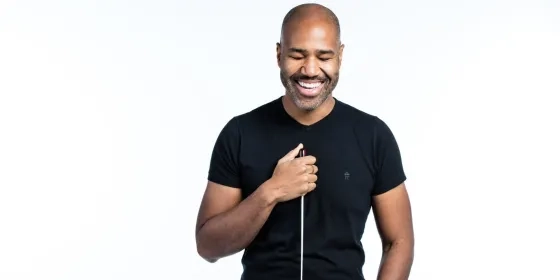EBCP Chair on Diversity in Music, Drag Queens, and Disruption: Meet Daniel Bartholomew-Poyser
Conductor and Emerging Black Composers Project Chair Daniel Bartholomew-Poyser on the road to diversity in classical music.
By Mark Taylor
Conductor Daniel Bartholomew-Poyser is focused on connecting with new audiences, on and off the stage. From his work blending classical and contemporary genres to collaborating with famous drag queens, he wants to bring the world of orchestral music into the next century.
When he puts down the baton, his work is very similar, in partnering with LGBTQ arts groups and organizations that push for diversity in music, with a goal of reimagining what symphonies could look like in the future. In 2019 the Canadian-born conductor joined forces with famous drag star Thorgy Thor in a documentary called Disruptor Conductor, showing Symphony Nova Scotia’s journey to create the first orchestral drag show in Canada. The show sold out both performances.
Today Bartholomew-Poyser is pushing boundaries in the United States in his continued effort to lift diverse voices in the music world. He is the new chair of the Emerging Black Composers Project (EBCP) at SFCM.
The SFCM Newsroom connected with the conductor, pedagogue, and public speaker on why he wanted to get involved with the EBCP, its role in the future of music, and why young composers should apply to the program before its deadline in February.
Tell us about your introduction to music?
I was introduced to music by my mom, at an early age, when I was placed in piano lessons, around the age of 5 years old. Next I had accordion lessons, the content of which I have totally forgotten. In Junior High School I decided to play tuba in band class, and that was the point at which music really took over.
What drew you to join the EBCP?
The struggle many historical black composers encountered getting their music heard, workshopped, and recognized weighs heavily on me. I saw, in participating in the Emerging Black Composers Project an opportunity to redress this inequity by working to promote black composers working today, giving them opportunities of which their forebears were deprived. I also relish the opportunity to have so many new scores passing through my hands.
What role do you hope the EBCP plays in increasing diversity in classical music?
I hope that we will be the launchpad for the careers of a number of musicians. There are many wonderful composers working today! I want people to know them. I want these composers to become household names.
Why is creating diversity in classical music important?
Diversity in classical music is important because the context in which classical musicians play is very diverse, and becoming more diverse. Why shouldn't the gifts of orchestral musicians be put to the service of the totality of contexts represented by their community? There is so much to enjoy in this world. Why limit ourselves? It is important to note who is playing, who is being played, who is listening, and who is making decisions. When we can answer those questions with an answer that comes close to "A group of people that by and large represents our local community" we can know that we are bringing artistic gifts not to just one segment of society, but to many people close to us, around us, who need to be lifted by an experience of beauty.
What can we learn from hearing from artists of different backgrounds?
I think the main thing we learn is how much we don't know. I have often been humbled by my experiences of musicians from different traditions and musical backgrounds; there is so much to learn!
What would you say to young Black composers considering applying to the EBCP?
Don't miss out on this opportunity to have people get to know you and your music. Apply now! Regardless of your final outcome, this will be an important step in getting your music into the hands of people who are eager to know your name and learn about you.
What are you most excited for in the future of music?
I am excited to see orchestras contextualize their offerings to their local communities. I am excited to see new people in the audience. I am excited to see new composers on the stands and all nations represented in the seats. I am most excited about all the music that we are going to experience in the next few years, both familiar and new.
Anything else you want to add?
Applications are open! Apply soon.
